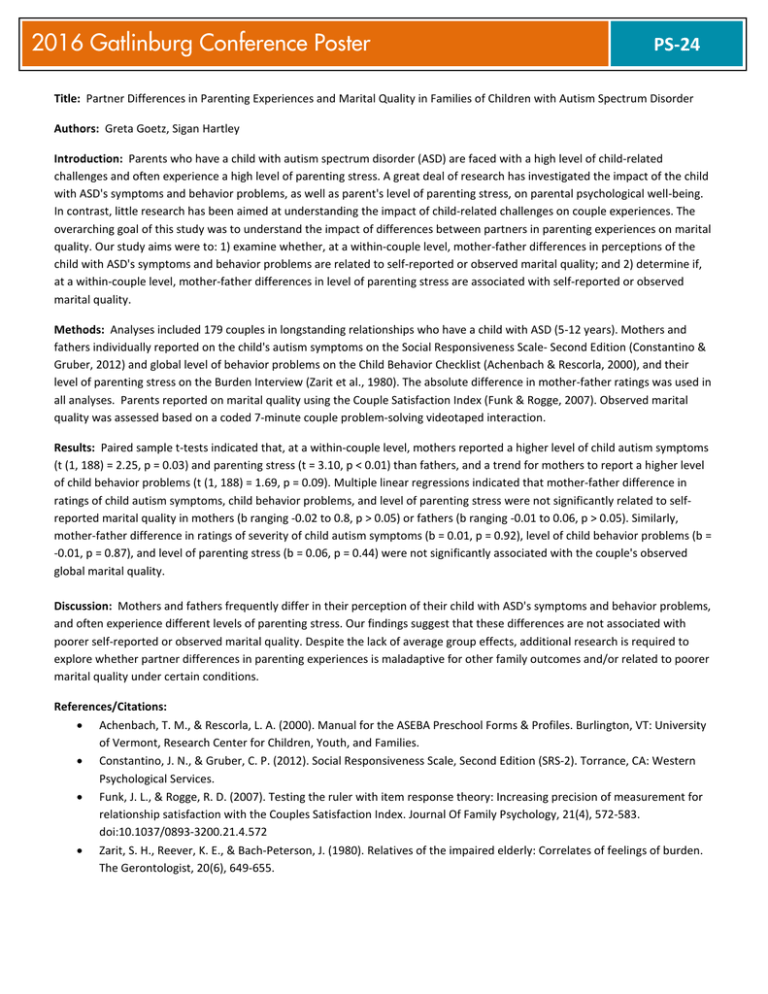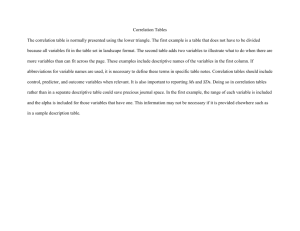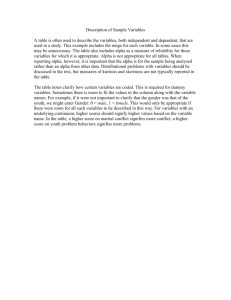2016 Gatlinburg Conference Poster PS-24
advertisement

2016 Gatlinburg Conference Poster PS-24 Title: Partner Differences in Parenting Experiences and Marital Quality in Families of Children with Autism Spectrum Disorder Authors: Greta Goetz, Sigan Hartley Introduction: Parents who have a child with autism spectrum disorder (ASD) are faced with a high level of child-related challenges and often experience a high level of parenting stress. A great deal of research has investigated the impact of the child with ASD's symptoms and behavior problems, as well as parent's level of parenting stress, on parental psychological well-being. In contrast, little research has been aimed at understanding the impact of child-related challenges on couple experiences. The overarching goal of this study was to understand the impact of differences between partners in parenting experiences on marital quality. Our study aims were to: 1) examine whether, at a within-couple level, mother-father differences in perceptions of the child with ASD's symptoms and behavior problems are related to self-reported or observed marital quality; and 2) determine if, at a within-couple level, mother-father differences in level of parenting stress are associated with self-reported or observed marital quality. Methods: Analyses included 179 couples in longstanding relationships who have a child with ASD (5-12 years). Mothers and fathers individually reported on the child's autism symptoms on the Social Responsiveness Scale- Second Edition (Constantino & Gruber, 2012) and global level of behavior problems on the Child Behavior Checklist (Achenbach & Rescorla, 2000), and their level of parenting stress on the Burden Interview (Zarit et al., 1980). The absolute difference in mother-father ratings was used in all analyses. Parents reported on marital quality using the Couple Satisfaction Index (Funk & Rogge, 2007). Observed marital quality was assessed based on a coded 7-minute couple problem-solving videotaped interaction. Results: Paired sample t-tests indicated that, at a within-couple level, mothers reported a higher level of child autism symptoms (t (1, 188) = 2.25, p = 0.03) and parenting stress (t = 3.10, p < 0.01) than fathers, and a trend for mothers to report a higher level of child behavior problems (t (1, 188) = 1.69, p = 0.09). Multiple linear regressions indicated that mother-father difference in ratings of child autism symptoms, child behavior problems, and level of parenting stress were not significantly related to selfreported marital quality in mothers (b ranging -0.02 to 0.8, p > 0.05) or fathers (b ranging -0.01 to 0.06, p > 0.05). Similarly, mother-father difference in ratings of severity of child autism symptoms (b = 0.01, p = 0.92), level of child behavior problems (b = -0.01, p = 0.87), and level of parenting stress (b = 0.06, p = 0.44) were not significantly associated with the couple's observed global marital quality. Discussion: Mothers and fathers frequently differ in their perception of their child with ASD's symptoms and behavior problems, and often experience different levels of parenting stress. Our findings suggest that these differences are not associated with poorer self-reported or observed marital quality. Despite the lack of average group effects, additional research is required to explore whether partner differences in parenting experiences is maladaptive for other family outcomes and/or related to poorer marital quality under certain conditions. References/Citations: • Achenbach, T. M., & Rescorla, L. A. (2000). Manual for the ASEBA Preschool Forms & Profiles. Burlington, VT: University of Vermont, Research Center for Children, Youth, and Families. • Constantino, J. N., & Gruber, C. P. (2012). Social Responsiveness Scale, Second Edition (SRS-2). Torrance, CA: Western Psychological Services. • Funk, J. L., & Rogge, R. D. (2007). Testing the ruler with item response theory: Increasing precision of measurement for relationship satisfaction with the Couples Satisfaction Index. Journal Of Family Psychology, 21(4), 572-583. doi:10.1037/0893-3200.21.4.572 • Zarit, S. H., Reever, K. E., & Bach-Peterson, J. (1980). Relatives of the impaired elderly: Correlates of feelings of burden. The Gerontologist, 20(6), 649-655.

